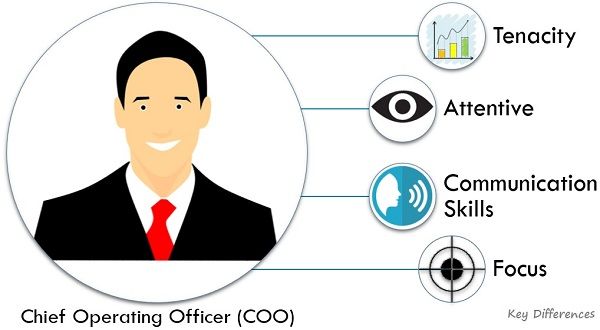 The Chief Executive Officer or CEO has a unique set of roles to play and responsibilities to fulfil in the organization, that can’t be delegated to the subordinate staff. It is the CEO of the company who identify the resource requirements, researches sources to raise funds, formulate strategies to approach the lenders, presents proposals and submits them. He/She administers the entire operations and effectively manages human resources.
The Chief Executive Officer or CEO has a unique set of roles to play and responsibilities to fulfil in the organization, that can’t be delegated to the subordinate staff. It is the CEO of the company who identify the resource requirements, researches sources to raise funds, formulate strategies to approach the lenders, presents proposals and submits them. He/She administers the entire operations and effectively manages human resources.
On the other hand, Chief Operating Officer or COO is the second-highest-ranking officer in the company, after CEO, who oversees the routine operations, and reports to the CEO about day to day working.
Both COOs and CEOs are tasked with high-level responsibilities, which has a great impact on the company’ success and failure. Now, this write-up will help you in understanding the difference between COO and CEO.
Content: COO Vs CEO
Comparison Chart
| Basis for Comparison | COO | CEO |
|---|---|---|
| Meaning | COO is the second in the chain of command, who handles the internal affairs of the organization, to ensure smooth operations. | CEO is the first in the chain of command, who is authorised as well as responsible for the company's management and operations. |
| Executive | Senior Corporate Executive | Most Senior Corporate Executive |
| Responsible for | Daily operations and administration | Management of the Organization |
| Charged with | Maximization of profits and customer satisfaction | Maximization of the value of the enterprise |
| Reports to | Chief Executive Officer (CEO) or Managing Director (MD) | Board of Directors (BOD) |
| Work | To implement the plans and strategies devised by the CEO. | To formulate plans and strategies for the company's growth. |
| Leadership | Exceptional Leadership | Authentic Leadership |
| Expected to | Assist the CEO in setting an appropriate and sound organizational structure. | Provide management supervision and responsibility across the organization and also provide powerful leadership. |
Definition of COO
The company’s COO or Chief Operating Officer is one of the senior executives, who are responsible for heading the company’s day to day administrative and operational activities. His/Her work is to implement the business plan as per the specified business model.
The chief operating officer works jointly with the chief executive officer (CEO) and chief financial officer (CFO) to develops the company’s annual operating plan to support the long term operational strategy of the firm.
Moreover, he/she assists the CEO in keeping an eye on the company’s achievements and also in maintaining a competitive position in the market. The COO has the power to maintain a positive work climate which is beneficial in gaining, retaining and motivating competent employees at different hierarchical levels.
Therefore, it is the company’s COO who:
- Maintains as well as improves the efficiency, cost-effectiveness and quality in the company’s operations.
The role performed by the Chief Operating Officer (COO) varies from one company to another. Large firms often have more than one COO, so as to look after different business lines and units. However, there are some organizations which do not have a single COO. He/She facilitates effective growth and also ensures operational efficiency and financial stability.
Definition of CEO
Chief Executive Officer, shortly known as CEO, refers to the top-most executive, in a corporate entity, elected by the company’s board members. He/She is the one who enacts the strategies which are officially approved and accepted by the board and also makes certain that the company’s overall anatomy and processes matchup the organization’s strategic and cultural requirements.
CEO is the person, who is in charge of the organization. The responsibilities are based on the nature, structure, type and needs of the concern. He/She is responsible for making corporate decisions, formulating and implementing long term plans and strategies, managing operations and resources. He/She acts as a communication link amidst the company’s board and operations.
He/She is answerable to the company’s board and in the case of non-profit organizations like state government, he/she is answerable to the governor. It must be noted that:
- The role and work of the CEO may vary on the basis of the size of the organization.
- The CEO is responsible for the company’s success and failure.
The CEO is supposed to act and behave with honesty and sincerity while complying with the organization’s code of conduct and values.
Key Differences Between COO and CEO
The difference between COO and CEO can be drawn clearly on the following grounds:
- Simply put, COO is one of the members of the company’s executive team, who is tasked with handling regular operations and administrative functions. On the contrary, the CEO is the person who leads the executive team and keeps an eye on the day to day functions and working of the concern, workforce and resources.
- While the CEO is first in the chain of command, COO is second in the chain of command.
- COO looks after the day to day operations and administration of the business enterprise, whereas CEO, is responsible for company’s management, in terms of arrangement and allocation of resources, overseeing operations, taking corporate decisions, etc.
- The company’s COO is charged with maximization of profits and customer satisfaction by ensuring that the company is operating in the most efficient manner. On the other hand, the CEO responsible for maximization of value of the company in terms of the stock price, market capitalization, revenue, profit, etc.
- As per the organizational hierarchy, the company’s chief operating officer reports to the CEO. As against, the CEO is answerable to the company’s board for the discharge of his/her role and responsibilities with an expectation that the CEO will keep the Board updated with all the factors, events, and conditions which are likely to influence or have a significant impact on the business organization.
- When it comes to working, the task of the COO is to implement the plans and strategies devised by the CEO. Conversely, the CEO
formulates plans and strategies for the company’s growth. - A CEO should follow authentic leadership approach as it focuses on the leader’s legitimacy and mission-oriented attitude. In contrast, a COO should have exceptional leadership, so as to forecast and manage risk and crisis before they arise, as well as to make the right decisions for the business.
- The company’s CEO is expected to come up with management supervision and responsibility throughout the organization in order to effectively run the concern. Along with that, he is also supposed to provide powerful leadership both internally (to the workforce) and externally (to stakeholders). On the contrary, the COO is supposed to assist the company’s chief executive officer in establishing a sound organizational structure.
Roles and Responsibilities of COO
The basic responsibility of the COO is to oversee the daily operations of the firm, including its various units, and divisions, as per the strategic plan and budget. The roles and responsibilities of a COO are:
- Implementing plans and strategies formulated by top-level management.
- Managing issues concerning financial growth and development, sales and marketing, research and development, production, purchase, personnel and so forth.
- Ensuring communication, resolving conflicts and developing project.
- Developing a culture which encourages ethical practices, individual integrity and customer focus.
- Identifying ways to improve business strategies and increase productivity and efficiency in operations.
- Formulating policies that propagate the company’s culture and vision.
- Finding out the areas of improvement and initiating change management across the business.
Roles and Responsibilities of CEO
In general, the scope, roles, responsibility and authority of CEO are defined in the organization’s governance charter, along with the official job description in the contract of employment. The roles and responsibilities of a CEO are discussed as under:
- Developing, planning, implementing and integrating the strategic direction.
- Ensuring that the firm’s leadership takes into account both the internal and external environment.
- Leading, directing, guiding, supervising and evaluating the work performed by the subordinate executives.
- Taking advice and guidance from the company’s board, whenever required.
- Formulating business plans strategies and budget for consideration by the company’s board of directors and implementing them.
- Making certain that the company’s operations and business are in line with the standards established by the board.
- Informing the board about the relevant developments in the company’s affairs, operations and business.
- Recognizing and managing the risks for the company.
Conclusion
Therefore, CEO must possess exceptional business judgement, because only then he/she will be able to guide the team in identifying the problems correctly, locating the issues in alternative courses of actions and choosing the most suitable one. On the other hand, a COO should possess good organizational, communication and leadership skills, so as to lead and guide the entire team.






Sanjay Kumar says
Nice explaining and it’s knowledgable